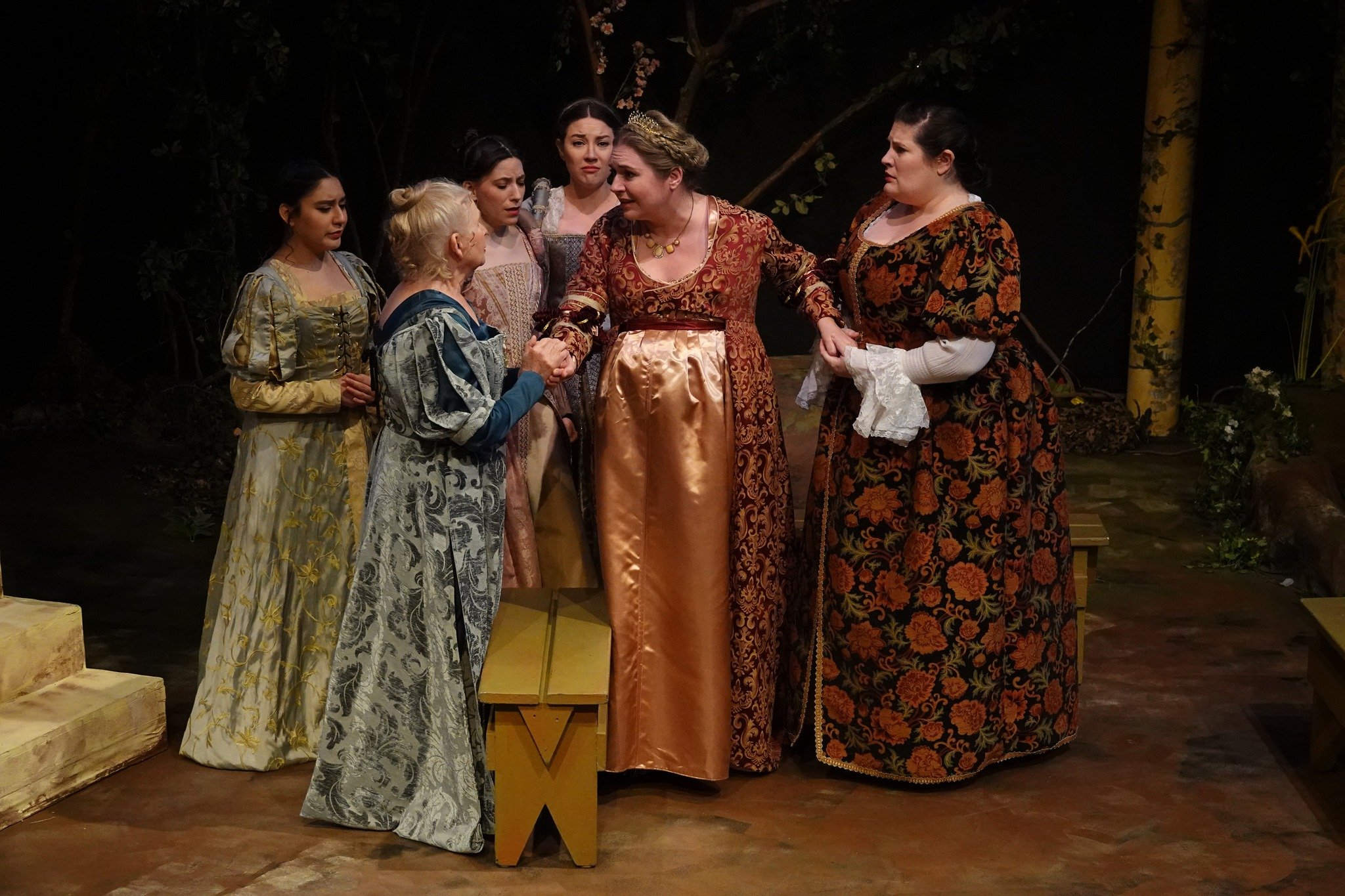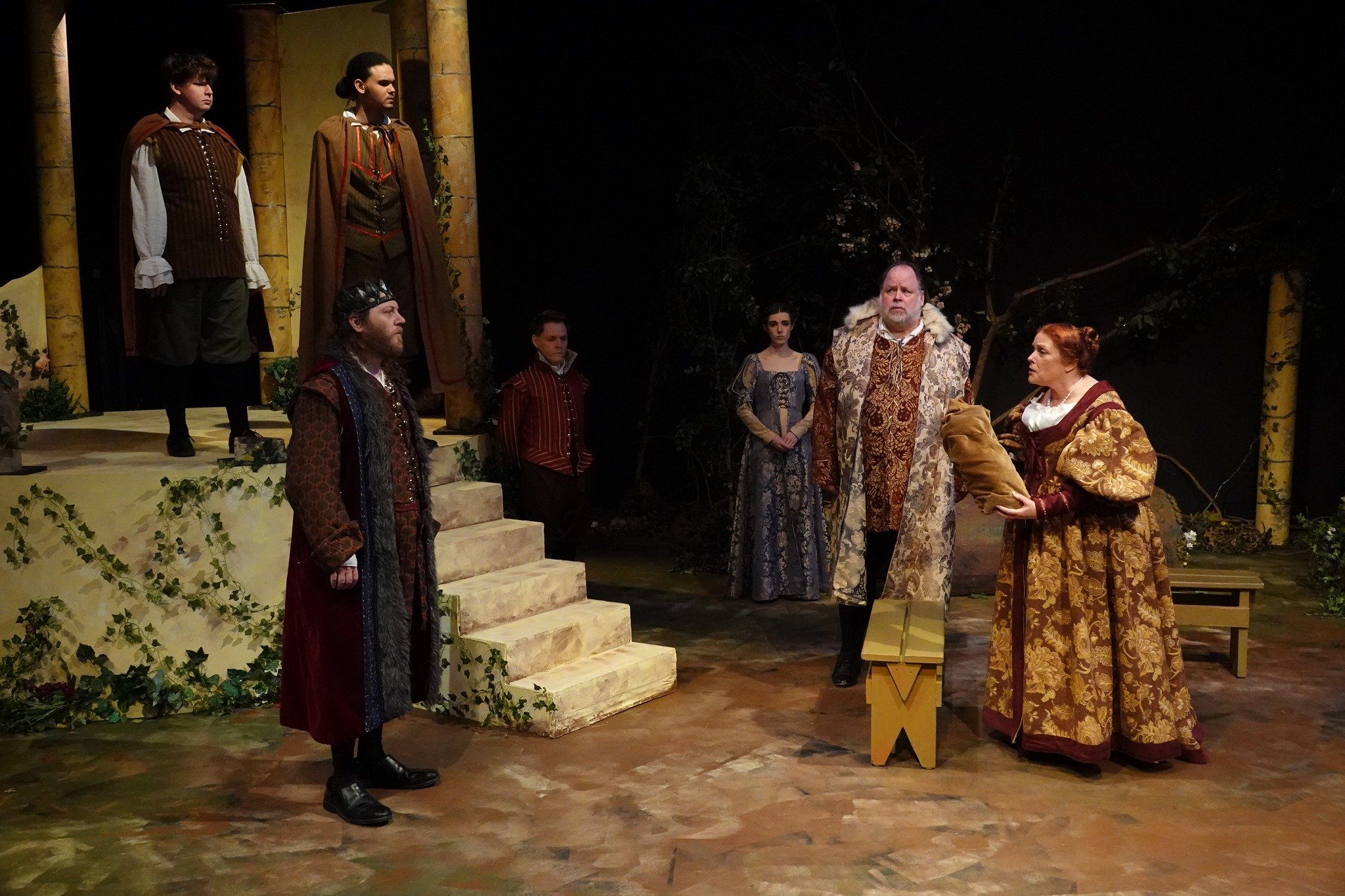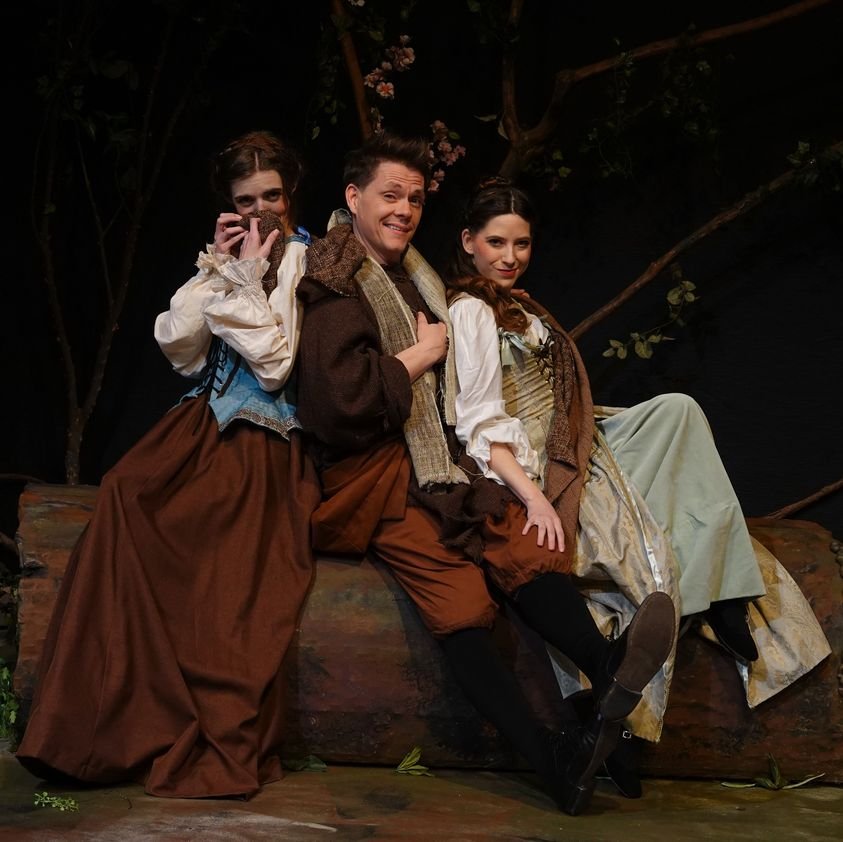The Winter’s Tale @ Stolen Shakespeare Festival 2023
Photos by Jennifer Stewart
—Jan Farrington
As always, Shakespeare’s The Winter’s Tale is a puzzling play for the actors—and for the audience. It’s good to keep in mind that Shakespeare may not have given us all the puzzle pieces. Especially in works written in his later career (and Winter’s Tale is among his last plays), he seems to enjoy keeping us more than a bit mystified.
Still, Stolen Shakespeare Guild gets many of the important elements right. Aaron Kozak is effective (and a bit scary) as King Leontes, who suddenly runs mad with jealousy and nearly destroys his life and family. Jessica Dahl-Colaw positively glows with niceness as Queen Hermione, the target of Leontes’ wrong-headed suspicions. Blake Hametner is Leontes’ childhood friend, King Polixenes, who’s come for a long visit that seems to be going well—but turns out, he’s very much outstayed his royal welcome. And Laura Jones is steadfast and outspoken as the Queen’s friend Paulina, who’s never afraid to tell it like it is…even to a king.
Directed by Jule Nelson-Duac with SSG founders Jason and Lauren Morgan, this Winter’s Tale perhaps needed to push the envelope more in the early moments. Showing us that Leontes goes from friendly dude to raving tyrant (in one short monologue) isn’t enough. We need to start getting a “vibe” from Leontes, picking up clues that the king is already in psychic trouble from the very start of the play.
Shakespeare is a genius about the human mind and spirit: Leontes is a very insecure man, and though he loves his wife and his old friend, he’s on the edge all the time, watching them—even when he’s the one who asks his faithful, pregnant queen to cajole and persuade Polixenes into staying longer.
There is a small clue: Leontes reminds Hermione (who, btw, is the daughter of a Czar of Russia, very high-born), seeming to make a joke of it, that it took her three months to decide she’d say “yes” to his marriage proposal. Is this the psychic wound he carries, and can’t let go of? Is there any other playwright in the world who was writing (400 years ago) about human psychology with such pinpoint accuracy?
Anyhoo…Polixenes escapes his jealous friend’s wrath (with the help of a gentle lord, Camillo, played by Jason Morgan). The Queen (who gives birth to her baby daughter in prison) is put on trial—but falls to the ground when she discovers that their son and heir (Matthew Benton) has died of grief. Leontes orders the baby princess killed, but Paulina sends her husband Antigonus away with the child. Hermione is pronounced dead—and as suddenly as Leontes went into madness, he comes out of it, seeming to repent and despair of all that’s happened.
The baby, Perdita, is found by an old shepherdess (Nancy Lamb is warm and funny), and taken off to be raised into the prettiest shepherdess/princess (Bethany Mejorado) we could want.
After intermission, a character called Time (why not?) tells us that 16 years have passed. What she/he/it doesn’t say is that this miniature Shakespeare tragedy is now turning into a big fat Romance, with exotic locale, singing and dancing villagers, and an angry father trying to ruin a love story between a prince (Parker Pereira) and a pretty maiden (Mejorado). There’s a dim-witted Clown (Will Frederick) two battling shepherdesses (Cory Carter and Karen Matheny) who want him anyway—and an unexplainable con-man who keeps turning up. (Derick Snow does his best, bless him, with Shakespeare’s least funny comic character.) We wish the bear had eaten him instead of nice Antigonus.
The second half goes on a bit. We’re waiting to see what happens—because a Romance (in the meaning of the word in the 1600s) should have a happy ending. In fact, Winter’s Tale has several. But on the other hand, even if lost people are found and we’re feeling fine, how can this couple and their daughter really, truly be a family again?
As the guy in the movie Shakespeare in Love says, “It’s a mystery.”
A savvy theater scholar I know says the word “grace” (in the religious sense of being shown mercy even if you don’t quite deserve it) shows up a lot in The Winter’s Tale. As in many of Shakespeare’s late plays, there is a father who needs to be forgiven by a daughter. Not a son or daughter—pretty much always a daughter. (Shakespeare’s daughter Susannah survived long past the death of her brother Hamnet, and her father.)
At the end of Winter’s Tale, Shakespeare is thinking, writing—and showing us something—about the mystery of grace and forgiveness. And that’s why, if we’re paying attention, we get misty-eyed at the ending. There’s hope for all of us.
WHEN: Through March 3
WHERE: 1300 Gendy Street (Museum District), Fort Worth



